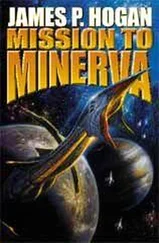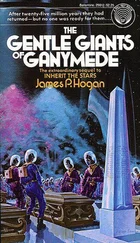James Hogan - Giant's Star
Здесь есть возможность читать онлайн «James Hogan - Giant's Star» весь текст электронной книги совершенно бесплатно (целиком полную версию без сокращений). В некоторых случаях можно слушать аудио, скачать через торрент в формате fb2 и присутствует краткое содержание. Жанр: Фантастика и фэнтези, на английском языке. Описание произведения, (предисловие) а так же отзывы посетителей доступны на портале библиотеки ЛибКат.
- Название:Giant's Star
- Автор:
- Жанр:
- Год:неизвестен
- ISBN:нет данных
- Рейтинг книги:4 / 5. Голосов: 1
-
Избранное:Добавить в избранное
- Отзывы:
-
Ваша оценка:
- 80
- 1
- 2
- 3
- 4
- 5
Giant's Star: краткое содержание, описание и аннотация
Предлагаем к чтению аннотацию, описание, краткое содержание или предисловие (зависит от того, что написал сам автор книги «Giant's Star»). Если вы не нашли необходимую информацию о книге — напишите в комментариях, мы постараемся отыскать её.
Giant's Star — читать онлайн бесплатно полную книгу (весь текст) целиком
Ниже представлен текст книги, разбитый по страницам. Система сохранения места последней прочитанной страницы, позволяет с удобством читать онлайн бесплатно книгу «Giant's Star», без необходимости каждый раз заново искать на чём Вы остановились. Поставьте закладку, и сможете в любой момент перейти на страницу, на которой закончили чтение.
Интервал:
Закладка:
It took Hunt a few seconds to see the implications of what Calazar had just said. He stared at the Ganymean in sudden surprise. "Not outside the solar system?" he queried. "I thought you said you didn’t establish large toroids inside planetary systems."
"It was an emergency," Calazar replied. "The Ganymeans decided to forget their rules for once. They didn’t have any time to spare."
Hunt’s eyes opened wider as the implication hit him: that was how Pluto had gotten to where it was! And that was what had broken the gravitational coupling between Minerva and its moon. One simple statement had put half his people at Navcomms out of business.
"So the Lunarian ancestors of the human race never came to Earth with the Moon at all," Karen Heller said. "They were taken there-by the Ganymeans. The Moon only showed up later."
"Yes," Calazar replied simply.
That answered another mystery. All the math models of the process had required a long transit time for the Moon to get from Minerva to the orbit of Earth. A lot of doubt had been expressed that a handful of Lunarian survivors could have lasted for any length of time at all, let alone with the resources necessary to reach Earth. But with Ganymean intervention added into the equation, all that changed. With some Ganymean help that handful would have established a secure settlement for themselves and been able to make a viable start at rebuilding their culture. So why had they plunged back into a barbarism that had taken tens of thousands of years to recover from? The only answer could be the upheavals caused by Luna being captured later. The truth was so ironic, Hunt thought: if they hadn’t been stabbed in the back by their own Moon, they could have been back into space by 45,000 B.C., if not sooner.
"But not all were taken to Earth," Danchekker concluded. "Another group was taken back to Thurien, and have since become the Jevlenese."
"It was so," Calazar confirmed.
"Even after all that had happened," Showm explained, "the Cerians and the Lambians were unmixable. Since the Lambians had been the cause of the trouble, the Ganymeans of that time considered that more good would come out of the Lambians being taken to Thurien and-it was hoped-being integrated into Ganymean ways and society. The Cerians were taken to Earth at their own request. They were offered ongoing aid to rebuild, but they declined. So a surveillance system was set up instead to keep an eye on them-as much for their own protection as anything." Hunt was surprised. If the surveillance system had been in place that long, the Ganymeans would have known about the collapse of the colony which they themselves had helped found. Why had they let it happen?
"So how did the others make out-the Lambians?" Heller asked. "They couldn’t have been running the surveillance that far back. How did they get their hands on it?"
Calazar emitted a heavy sigh. "They caused a lot of problems for the Thuriens of that time, so much so that when Luna came to be captured by Earth and caused widespread catastrophes that demolished the fragile beginnings of the new Cerian society that had started to take root there, it was decided to leave things be. With troubles of their own at home, the Thuriens were not eager to see another human civilization rushing headlong toward advancement, perhaps to repeat the Minervan disaster." He shrugged as if to say that right or wrong, that was the way it had been, then resumed, "But as time went by and further generations of Lambians came and went, the situation seemed to improve. Signs appeared that they could be integrated fully into Ganymean society, so the Ganymean leaders adopted a policy of appeasement in an attempt to accelerate the process. As a result the Jevlenese, as the descendants of the Lambians were called by then, acquired control of the surveillance program."
"A mistake," Showm commented. "They should have been exiled."
"With hindsight, I think I agree," Calazar said. "But that was long before either my time or yours."
"How about telling us something about this system," Hunt suggested. "How does it work?"
Eesyan answered. "Mostly from space. Until about a century ago, it was comparatively simple. Since Earth entered its electronics and space era, the Jevlenese have had to be more careful. Their devices are very small and virtually undetectable. Most of their information comes from intercepting and retransmitting your communications, such as the laser links between Jupiter and Earth. At one time in the early years of your space program they manufactured instrument packages to resemble pieces of your own space debris, but they had to stop when you started clearing things up. That experiment had its uses though; that was where we got the idea of building a perceptron that looked like a Boeing."
"But how could they fake the reports as well as they did?" Hunt asked. "They must have something of their own like VISAR. No Mickey Mouse computer did that."
"They have," Eesyan told him. "Long ago, when there seemed reason to feel optimistic about the Jevlenese, the Thuriens helped them establish their own autonomous world. It’s called Jevlen, on the fringe of our developed region of space, and it’s equipped with a system known as JEVEX, which is VISAR-like but independent of VISAR. Like VISAR, JEVEX operates across its own system of many stars. The surveillance system from Earth is coupled into JEVEX, and the reports that we receive are transmitted indirectly from JEVEX through VISAR."
"So it isn’t difficult to understand how the fabrications and distortions were engineered," Showm said. "So much for philanthropy. They should never have been allowed to operate such a system."
"But why did they do it?" Karen Heller asked. "We still don’t have an answer. Their reports were pretty accurate up until about the time of World War II. The problems of the late twentieth century were somewhat exaggerated, but for the last thirty years it’s turned into pure fiction. Why would they want you to think we were still heading for World War III?"
"Who can understand the contortions of human minds?" Showm asked, using the general term unconsciously.
Hunt just caught the look that she flashed involuntarily at Calazar as she spoke. There was something more behind it all, he realized-something that the Thuriens were not divulging even now. Whatever it was, he was just as certain in that same split second that Garuth and Shilohin didn’t know about it, either. But he didn’t feel this was the time to force a confrontation. Instead he steered the discussion back into technicalities as he remembered something else. "What kind of archives does JEVEX have?" he asked. "Do they go all the way back to the Ganymean civilization on Minerva, like VISAR’s?"
"No," Eesyan replied. "JEVEX is of much more recent vintage. There was no need to load it with VISAR’s complete archives, which concerned only Ganymeans." He studied Hunt curiously for a few seconds. "Are you thinking about the anomalies in the displacements of background stars that VISAR noticed in the shots of the Shapieron? "
Hunt nodded. "That explains it, doesn’t it? JEVEX couldn’t have known about the displacements. VISAR had access to the original design data for the ship; JEVEX didn’t."
"Correct," Eesyan said. "There were a few other anomalies too, but all similar-all to do with an old Ganymean technology that JEVEX couldn’t have known very much about. That was when we became suspicious." At which point everything that had ever come from JEVEX would be suspect, Hunt saw. But there would have been no way of checking any of the rest without bypassing the Jevlenese completely and going straight to the source of the information-Earth. And that was precisely what the Thuriens had done.
Calazar seemed anxious to move them away from the whole topic. When a lull presented itself, he said, "Garuth wanted me to show you another sequence that he thought you would find interesting. VISAR, show us the Ganymean landing at Gorda."
Читать дальшеИнтервал:
Закладка:
Похожие книги на «Giant's Star»
Представляем Вашему вниманию похожие книги на «Giant's Star» списком для выбора. Мы отобрали схожую по названию и смыслу литературу в надежде предоставить читателям больше вариантов отыскать новые, интересные, ещё непрочитанные произведения.
Обсуждение, отзывы о книге «Giant's Star» и просто собственные мнения читателей. Оставьте ваши комментарии, напишите, что Вы думаете о произведении, его смысле или главных героях. Укажите что конкретно понравилось, а что нет, и почему Вы так считаете.










